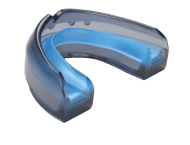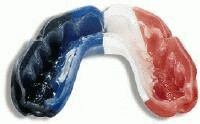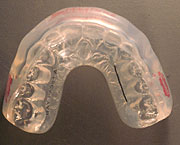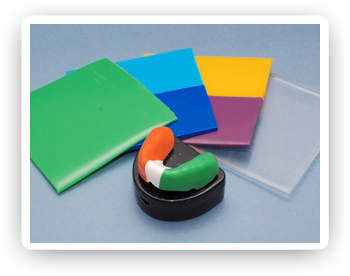Sports Guards – Protection Against Trauma
Sports (athletic) mouthguards are plastic dental appliances that can provide a degree of protection for both the mouth’s soft tissues (lips, cheeks, gums, tongue) and hard tissues (teeth and jawbones). While all guards are made of plastic their specific design, composition, and method of fabrication vary. In general, there are three types of sports mouthpieces: stock, boil and bite, and custom. Each guard provides a different level of protection and is suitable for different types of activities.
There are a number of sports where it should be obvious that a mouth protector should be worn. Athletes participating in contact sports like football, boxing, ice hockey, lacrosse, field hockey, soccer, rugby, basketball, martial arts, water polo, and wrestling should protect their mouth with a guard. Other sports, while not being true contact sports, can still provide ample potential for collisions with objects or other athletes. Participants in handball, racquetball, baseball, skateboarding, rollerblading, skiing, skydiving, squash, surfing, volleyball, gymnastics, acrobatics, tennis, and bicycling should all make a point of obtaining and wearing mouth protection.
Let us know what sports you or your children are particpating in and we will be happy to recommend one. In addition, if you have doubts or questions about the level of protection a certain guard might provide, bring it with you and we will check it out!
Protection of Teeth and Bones

Protection of Soft Tissue

The rounded contours of a comparatively soft mouthguard can help to protect lips, cheeks, and even the tongue to some degree. It seems inconceivable that a person who has braces (is undergoing orthodontic treatment) would even consider participating in any sort of sporting activity without wearing a mouth protector.
The potential for lip and cheek laceration being so ripe in this instance that its occurrence might almost be regarded as a certainty. For those athletes who have missing teeth the plastic of a custom formed mouthguard can fill in and surround their remaining teeth, thus providing the support that they need. This means that a removable dental appliance such as a partial denture can be left out, thus avoiding any potential for damage to it or from it.
Protection From Concussion
Some studies have suggested that wearing a mouthguard can help to reduce the incidence or severity of concussions. Forces delivered to the jawbones will be transmitted on to the skull bones that surround a person’s brain, thus producing the potential for concussion. A mouthguard can buffer these transmissions by way of partially absorbing and then also dispersing them. The theory is that this effect can lessen the intensity of the forces of the blow and therefore the likelihood that concussion will occur.



